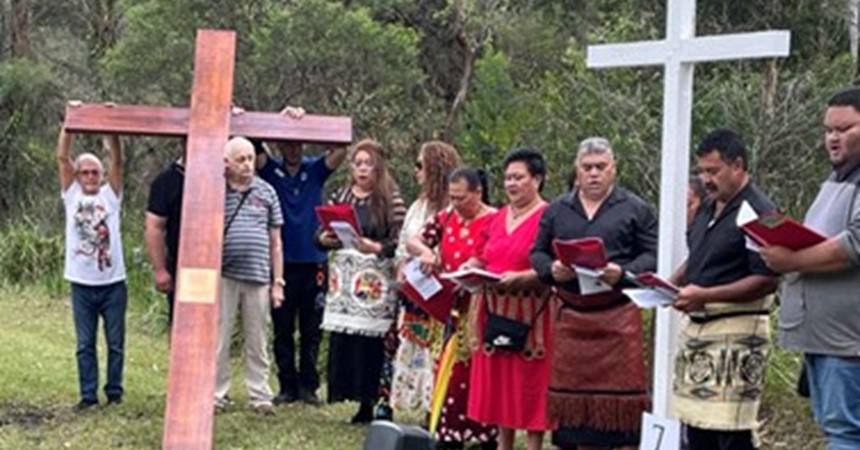I have just returned home from this year’s Way of the Cross at Kilaben Bay at which we reflected on “That they may all be one” from John 17:21. This year, each of 14 different cultural groups led us through one of the 14 stations, providing us with the gift of their language, songs and for some, their cultural dress.
There we were in the bush setting which has been the site of our diocesan Ecumenical Stations of the Cross since 2007, when the Journey of the Cross and Icon came to our diocese in the year before the Sydney World Youth Day (WYD); a continuation of the nearly 60-year journey of the Way of the Cross in the Diocese.
After following our own diocesan WYD Cross with Bishop Michael Kennedy and about 200 other pilgrims, we were treated to a taste of food of many of the cultural groups with afternoon tea. One Vietnamese lady commented to me that “she cried all the way through the Stations because it was so moving”.
How blessed are we to live harmoniously in a country with its many cultural groups. During the week, on 21 March, we celebrate Harmony Day which celebrates unity and diversity. It is customary on this day to wear orange, relating to social communication, stimulating two-way conversations. It is about inclusiveness, respect, and a sense of belonging for everyone.
We speak of everyone belonging and yet part of me recognises the hardship created when people either willingly or are forced to leave their homeland. It cannot be easy to leave your family, your language, your way of life, your food, and your customs to call another place home. Many arrivals to Australia have left their country because of the violence of war or its aftermath.
The Aboriginal and Torres Strait Islander people were joined by the following ethnic communities – Filipino, Syro-Malabar, Sri Lankan, Maltese, Polish, Tongan, Croatian, Lutherans, Nigeria, Italians, Vietnamese, South American and Samoan. What a rich diversity of people, story, and heritage, all within our Catholic community of faith.
I invite you to think of the stories of these various communities who are now calling Australia home. We have welcomed them; however, I am conscious of their sense of grief and loss. For many, great distances separate them from their homeland and their families. For some, they fear for those left behind, because of the instability and violence of their countries of origin.
The story of Lazarus (John 11:1-45) in today’s reading from Year A, serves to remind us that Jesus also felt the pain of grief and loss. Lazarus, along with Mary and Martha are his friends; the Gospel says that Jesus loves them. When the sisters greet him, he feels their loss and weeps. I thought of this scene while walking the Way this afternoon and the grief for the people of these many cultures who have left their homeland. Jesus understands and feels for them, the same as we should. Their losses can be huge and can be passed on from one generation to the next.
I am also conscious of my own imminent change in finishing full-time ministry. Change is an invitation to let go and to discover a new path. There is a time of adjustment, of being in what is known as the liminal space. Liminality, the middle stage between what is familiar, and the unknown can be disorientating.
I am also aware that this is not only happening for me but for the staff in Pastoral Ministries and for many across the diocese. I have been in my role in the diocese for almost 19 years and so I am acquainted with many people across the diocesan community. So, several people have expressed to me a deep sense of loss while also expressing their appreciation. We are doing this transitioning together. We are journeying into the unknown, for me life beyond working full-time and for the diocesan community, life without me in the role and waiting for someone else to take my place. This is unsettling, as together we await the crossing of a threshold.
Like this afternoon, ritual plays an important part in personal and institutional transitions. In the story of Lazarus, people were gathered around Mary and Martha, feeling their loss, and supporting them. Our church is good at rituals and the marking of our stages of life. The diocesan community will be invited to a diocesan gathering to mark this stage of transition for me and for the community. What is familiar to us will be changed to a state of the unknown.
And now to return to this afternoon’s Way of the Cross. I sense that this ritual may have assisted each of these communities in the ongoing transition of belonging. They were able to gather with their ‘tribe’, to use their language and to be accepted into their new home. For some, it may have been their parents or grandparents who were courageous enough to leave their homeland and embark on finding a new place to call home. I believe, there is still a need to connect with their roots, to know from where they have come, to hold those stories while at the same time embracing a sense of belonging to this ‘new world’.
As humans we are so connected and as Catholic Christians, that connection runs deep in our souls because we share a common belief in a God who loves us and in his Son who gave his life for our salvation. No matter our place of origin, this afternoon and at weekly Eucharist we are connected to each other in the bond of faith, hope and love.
Follow mnnews.today on Facebook.

